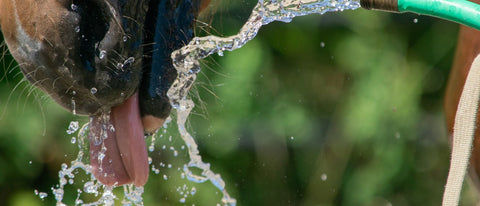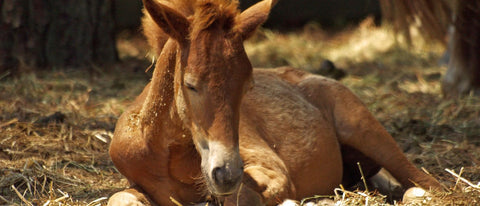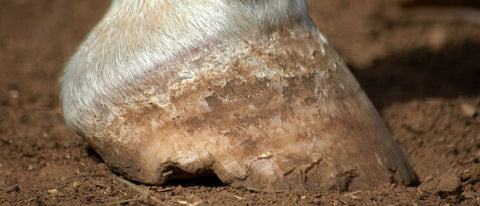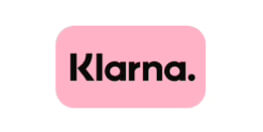
Florian ist aufgewachsen auf einem Bauernhof. Umgeben von Pferden, entdeckte er früh seine Faszination für diese majestätischen Tiere. Inspiriert von seiner reitbegeisterten Mutter, entwickelte er das Nahrungsergänzungmittel - Pferdegold. Seine tiefe Verbundenheit zur Natur und die leidenschaftliche Hingabe zu Pferden trieben ihn an, sein Unternehmen zu gründen.
Electrolytes for horses are not only essential for physical performance, but also for general well-being.
In this article, we explore the importance of electrolytes and provide valuable insights into how you can best support your horse's health.
Learn more about the essential role of electrolytes and why they are essential for every horse!
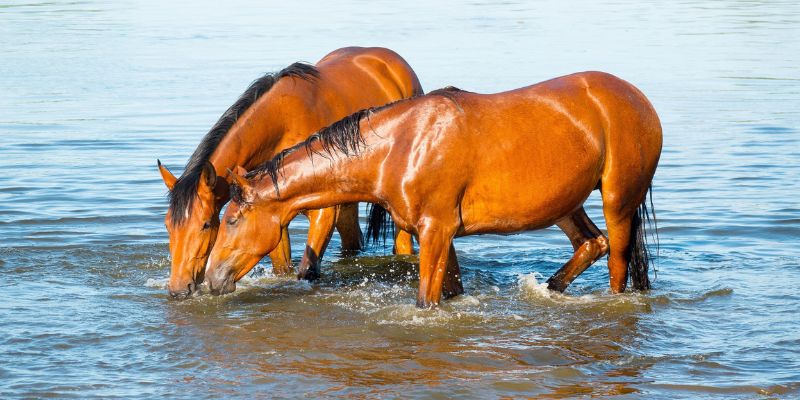
What are electrolytes?
Electrolytes are much more than simple salts; they are vital for numerous biological processes in your horse's body.
Electrolytes can also be described as regulators that ensure that everything stays in balance and your horse can be happy and active.
Sodium and chlorine
Sodium and chlorine are two of the main electrolytes in a horse's body . They play a crucial role in maintaining fluid balance and are essential for nerve function.
Without them, the balance in your horse's body would be disturbed and it would not be able to perform to its full potential.
They are also essential for maintaining blood pressure and the function of muscles and nerves.
potassium
Potassium is another important electrolyte for horses . It plays a key role in regulating water balance and supports muscle function.
A lack of potassium can lead to muscle weakness and exhaustion , so it is important to ensure your horse gets enough of it.
In addition, potassium is crucial for heart function and helps regulate electrolyte balance in cells.

Perfect for your horse: Pferdegold® supplementary feed!
These specially developed supplements support your horse's diet and provide it with natural nutrients. Made in Germany, grain-free and drug-free, they come with a 30-day money-back guarantee.
Try it now!What can cause electrolyte deficiency in horses?
An electrolyte deficiency in horses can have many causes and should not be taken lightly.
This deficiency can significantly impair your horse's well-being and performance .
Some of the most common triggers for electrolyte deficiency are:
+ Heavy sweating: Especially during intensive work or high temperatures, your horse can lose a lot of fluid and therefore electrolytes.
This can be especially the case during longer training sessions or competitions on hot days if sweat loss is not compensated for in time.
+ Inadequate intake: An unbalanced diet can result in your horse not absorbing enough electrolytes.
It is therefore crucial to maintain a balanced and nutritious diet that contains all the necessary minerals and vitamins.
+ Illnesses: Illnesses accompanied by diarrhea can severely affect your horse's electrolyte balance.
In such cases, it is especially important to act quickly and seek advice from a veterinarian to restore electrolyte balance.

Electrolyte deficiency: Signs and typical symptoms in horses
Electrolyte deficiency in horses can cause a variety of signs and symptoms. It is important to detect these early to ensure the horse's well-being.
While the symptoms of electrolyte deficiency can vary, there are some that are particularly common.
Here are five signs that could indicate a possible electrolyte deficiency in your horse :
-
Weakness and exhaustion: Horses suffering from electrolyte deficiency may appear lethargic, their performance may decrease, and they may show less interest in activities.
-
Muscle twitching or cramps: These can occur due to electrolyte imbalance and are a clear signal that something is out of balance within the horse.
-
Altered heart rate and breathing: Heart rate or breathing rate may be increased in response to electrolyte depletion, which may indicate increased stress levels and discomfort.
-
Confusion or disorientation: Electrolyte deficiency can affect the horse's behavior and lead to confusion, disorientation, or even altered perception.
- Diarrhea: Diarrhea can lead to further and, above all, rapid loss of electrolytes and is a serious sign that requires immediate attention

What should be taken into account when taking it?
When using Pferdegold® Electrolytes, it is important to follow the dosage recommendations: Small horses and ponies (up to 600 kg) need 1 measuring spoon once a day , while large horses (over 600 kg) need 2 measuring spoons once a day .
The pellets can be easily added to the food and can be fed continuously.
Please make sure to keep an eye on the vitamin and mineral content of other feed additives so as not to exceed your horse's required daily ration of minerals, trace elements and vitamins.
Thanks to the pure and researched ingredients, regular and long-term use at the prescribed dosage is safe and is characterized by very good tolerability.

5 more tips to keep your electrolyte balance in balance
There are various approaches to help your horse maintain a balanced electrolyte balance.
Here are five tried-and-tested tips for you:
-
Add electrolytes to the feed as pellets: This method is particularly easy to dose and can help support your horse's electrolyte balance – especially after physical exertion and in high temperatures.
-
Provide sufficient water: It is essential that your horse consumes sufficient water to regulate electrolyte balance and prevent dehydration.
-
Balanced diet: A balanced diet rich in vitamins and minerals can help support electrolyte balance and promote the horse's overall well-being.
-
Regular check-ups: By regularly monitoring your horse's health, you can detect possible signs of electrolyte deficiency early on.
- Adjustments for increased needs: During intense physical activity or high temperatures, the need for electrolytes may increase. In such cases, it may be beneficial to adjust your intake accordingly.
These tips are general recommendations and do not replace the advice of a veterinarian. If you have any concerns or health problems with your horse, you should always consult a professional.

Pferdegold® supplementary feed!
Pferdegold is a small family business from Bavaria with a big dream: to produce the best horse feed. We see ourselves as a family of equestrians who want to provide your horse with the ideal nutrition. 100% natural and perfectly tailored to your horse's needs.
Try it now!Conclusion
The role of electrolytes in your horse's well-being and vitality cannot be overestimated. They form the foundation for numerous bodily functions and help keep your horse vital and energetic.
This will help your horse to gallop across the fields with joy and enthusiasm!
FAQ
Electrolytes for horses – is normal salt enough?
While regular salt can provide some electrolytes, it does not provide the full spectrum of essential electrolytes a horse needs.
A balanced electrolyte intake is therefore important.
What are the consequences of a mineral deficiency?
A mineral deficiency can lead to various health problems, including weakness, muscle weakness and electrolyte imbalance.
It is therefore important to pay attention to a balanced diet.
How many liters of sweat has my horse lost?
The amount of sweat lost in horses can vary greatly, and unfortunately there is no one-size-fits-all answer – too many factors such as temperature, activity level and the individual characteristics of each horse play a role.
That's why it's especially important to always keep a watchful eye for possible signs of dehydration and act promptly to ensure your horse gets the well-being it deserves!
IMPORTANT:
Pferdegold is not a substitute for veterinary diagnosis or treatment . The information contained in this article is for general informational purposes only and is intended to help improve your horse's well-being.
Pferdegold products do not treat or cure diseases , but rather support your horse in correcting nutritional deficiencies through targeted nutrient intake. However, they are not a substitute for professional advice from a veterinarian or specialist.
If your horse has any health problems , we strongly recommend consulting a veterinarian . Pferdegold assumes no liability for decisions made based on the information provided here.
